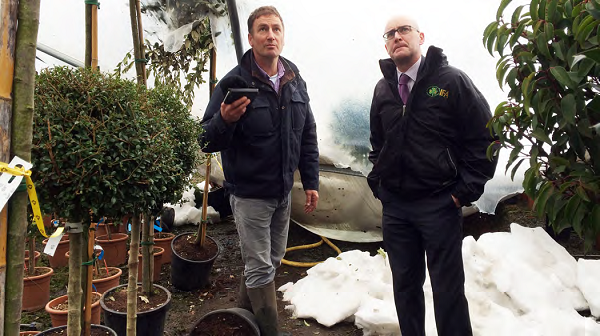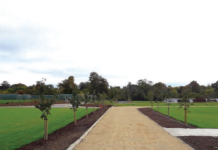Teagasc nursery stock/ornamentals advisor, Dónall Flanagan captures the chilling reality of the damaged wreaked by Storm Emma and the Beast from the East
Bread shortages were the least of our concerns during Storm Emma. The impact was quick
and severe. I think we can all say that what we saw was like something that happens in other countries – never in Ireland, until now. Over 36 hours in the early days of March up to a metre of snow fell on the east coast of Ireland, drifting to well over 2m in places. With plenty of warning in advance growers had time to prepare: snow shovels, ropes, brooms, bamboos and leaf blowers to knock snow off tunnels. Glass houses were readied, thermal screens lifted, fleece put on. Heaters purchased in 2010 were dusted down and fuelled up. Tunnels were braced if they didn’t have snow bars. Knives were taped to long handles to cut polytunnels away if it got really bad.
While most of Ireland was watching the storm reports on TV, growers were shovelling snow to save their businesses. The heated glass was burning through oil, gas or wood chip at a
phenomenal rate. PJ McMahon from Kilmoon Cross Nursery says: “We burned 10,000 litres of oil and 16 tonnes of wood pellets. Constant maintenance and repairs were running at this high level. One fruit grower spent €8,000 heating his glass over the cold period. I have heard that some tomato growers were running up to 600C to keep the snow levels down. 30cm of snow is about the maximum that modern glass can withstand, polythene houses might take up to 44cm snow or more. Saturday morning [3 March] growers woke to see the unimaginable damage. I estimate the cost to the nursery and fruit sector will be in the millions of euros just for repairs and replacements – cash flow lost during the peak of the season is impossible to calculate. Growers that came away with little damage worked hard, had made preparations and were lucky.”
I don’t know what must run through your mind after seeing your livelihood and your life’s work smashed. The picture unfolded very quickly. Exceptional levels of snow fell in two
main pockets: east Kildare and Wicklow, Wexford border saw the worst damage. Soft fruit, salad, bedding and nursery growers were hit along with many farmers. A Taoiseach
visited some sites in Wexford, including O’Connor’s Nursery, shortly after the damage was done. O’Connors Nursery was one of the worst hit, losing some new and old glass on their
main site. All growers on the Barnland site had some damage, John Nangle lost 1 ½ acres. Over the following days it was heartening to hear of all the offers of support coming in; extra space, labour, spare potting machines and more. The media was keen to report the unfolding scene. Colin Campbell’s nursery was very badly damaged – he was interviewed on Liveline and on TV. He gave a very good picture of what challenges lay ahead.
Looking further afield, to the eastern states of the USA that would occasionally see both severe snowstorms and hurricanes, speaking with growers there, they say that insurance often picks up much of the cost, but clean up and stress are added costs not usually covered. It’s never an easy recovery. We often hear of emergency funds being made
available after hurricanes etc. The US government has offered low-cost loans in extreme cases, but the industry has found that is generally not very helpful.
Speaking with Alan Jones of Manor View Farm, Maryland: “Generally, growers have ended up making it work themselves, but we have often seen growers who did not suffer damage helping out those who did. You find out who your true friends are.” Discussions amongst growers were lively at the Teagasc Nursery Stock spring meeting on 7 March. It is clear that insurance is the real issue to be resolved, more than government support in times of crisis. It is difficult to get insurance for polytunnels in Ireland, some insurers ask for tunnels to be recladded every three years. Other insurers will only insure a tunnel from new; if there is a lapse in the policy they will not offer cover for it again. Structures can be insured and if they fail the plastic may be covered by the policy. Glasshouse cover is available from other European countries e.g. the Netherlands through brokers. Stock cover where available is expensive, sometimes the premium is the value of the crop itself. Tomato crops have a very predictable pattern and value. In ornamental and nursery stock the value and volume of stock can vary widely during the year. To prevent over or underinsuring, stock levels need to be reviewed every three months and premiums adjusted accordingly. Where insurance is not viable or available it’s a serious barrier to
business. As an upside to insurance, when your crop is insured and damaged the insurers are very quick to make repairs to prevent further losses.
Those who had planned ahead and been best prepared will pick themselves up faster than those who didn’t. Like the army general who focuses his attention on the immediate war at the expense of the long war. Planning for such rare events might seem like a waste of time when you’re busy but with two red alert weather events in six months it might not
be such a waste of time after all.
Usually, where risk occurs in trade there is a suitable reward for the business. Where margins are so tight in food and plants it is only the bravest, luckiest and those with deep reserves that will survive into the future. As I write, the Department of Agriculture has confirmed that anyone who was approved for grant aid for 2018 can transfer the value of the grant to repairs if needed.
Dermot Callaghan, head of horticulture in Teagasc says, “The speed that people are dealing with the issue and trying to get back on track is very impressive. Everyone is trying to help get them back to business as normal as quickly as possible.” Growers impacted by the storm have said they really appreciate the continued support. All are trading, taking orders and busily getting ready for the hectic spring season. We all wish them the very best of luck. ✽
  Dónall Flanagan, Ashtown Food Research Centre Mobile: 087 703 5823; Tel: 076 111 4021 Email: donall.flanagan@teagasc.ie |








